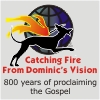
Are We There Yet? Sadly, we live in a world that has lost the ability to wait in patience. We are like Lucy in one of my favorite Peanuts cartoons. The first frames show her saying, “I was praying for patience; but I stopped.” In the last panel she says defiantly, “I was afraid I might get it.” Around us, the Christmas decorations go up on September 1, and the buying extravaganza begins at 12:01 am on the Friday after Thanksgiving, and on December 26, the Valentines come out. As we drive along, countless drivers run red lights, try to pass on shoulders—anything for a few seconds gain. E-mail, with all its convenience, also lures us into rapid replies and rushed decisions. We gather today to counter this rapid rush to get going, get things done. We come willing to wait in patience. We listen to the Word of God for us today—what God is talking about today, December 15, in our lives. We are part of a very long story, and our first reading links us with one who tells us what we are to expect in this, God’s world. We are to expect the message of fire. Sirach tells us that Elijah brought fire three times to demonstrate God’s power and presence. We, too, are asked to bring fire into our lives as we continue our Advent journey. Fire is a mystery. It is light. It is warmth. It is energy. When we contemplate fire, especially from a distance, our first sensory impression is light. Even at a distance, the campfire or the tiny candle cast their rays into what was darkened. The many scriptural passages about light emphasize its importance. Genesis has God beginning the great story of the universe with the invitation to light. The cosmic story opens with bursts of light that scatter creativity throughout the worlds. The story of Christ is that of the light that cannot be conquered. We are “sons of the morning and daughters of day,“ and we, too, are to share in enlightening the world. In a special way our Dominican heritage is to take the torch of truth and hold it high. So we are to bring fire that is the source of light. But how can we share this flame fully if we live in partial darkness? Where are the dim areas that need to be made clear? We are called this day to begin by looking into our minds and hearts and asking for the Spirit to set us on fire, as the Pentecost flame burned away fears and doubts and those blessed by it went forth to spread good news to the whole world. We are to look not so much up to the heavens, as down at our own lives. Are there people around us whose needs we do not see because of darkness? Is there any way that we can dispel the murkiness that often clouds our personal and political decisions? There is no act too small. Decades ago, the founder of the Christopher movement stated, “It is better to light one candle than to curse the darkness.” Rosa Parks lit her candle; its flame showed us the evil dark of racism and bigotry. May we leave today in the hope and pledge that each of us, like Elijah, will bring fire as we light our candles in these days before Christmas. Like him, we call down fire for a second time. Fire brings us warmth both literally and symbolically. This is the fire directly linked to the word ‘patience”. Its origins are to endure, to bear, to put up with, and our flame is our call to compassion, to suffer with others. Often it seems easier to feel and express this emotion for those at a distance: the suffering victims of war, of Aids, of poverty, of violence and injustice and our own friends and neighbors in Lewis County. I would not say that we are wrong to reach out to these, our sisters and brothers, but we are also called to compassion for those around us and those who share our lives. Genuine compassion embraces those who hold differing theologies and ethical systems. Often we must struggle to accept them without accepting their beliefs. As I reflected on this preaching, I remembered a news report that asked if those “hard-core terrorists” detained in U.S. prisons enjoy the rights of citizens. The argument against is that granting these rights, such as speedy trials and appeal, would endanger national security. Do we find ourselves, consciously or unconsciously, buying into this philosophy? Do we challenge those around us who preach it? Would we, consciously or unconsciously accept security as our primary goal? The warmth of our fire is to permeate our relationships. When we care and demonstrate our concern, we preach the good news. Several years ago, at a Mass in College Church, St. Louis, the presiding priest left the altar to put an arm around a disturbed street person who had wandered in and was causing a small disturbance. The priest led him to a front pew and said, “Just wait here for a few minutes, and I’ll help you.” I do not recall the readings of the day or the homily; I will never forget the preaching. Sometimes we look at the “O.P” after our names and wonder if we live our charism. Yet we are always called to compassion—with a word, a smile, and a sincere “God bless you.” This is our preaching, and our sharing the fire. Fire shows us the dark places in need of light; fire calls us to compassion. Finally, fire energizes us for mission—at a cost. Every fire comes from something being consumed, used up, changed. These candles give everything of their substance to gift us with light. The meaning of Christmas, of the In-carnation, is, quite simply, that of total giving. Christ Jesus did not think even divinity something to be hoarded, but he emptied himself, to become a slave. He became a slave, not a servant as most translations state and consequently lessen the impact, but a slave—the most ignoble, despised, not quite human, to be found in society, I’m afraid I am not there yet. There is much in me that resists the passion and the prophetic vision symbolized by fire. I know that I settle for a tiny flicker, not a consuming flame. I fear the blazing fire that Christ stated he came to send on the earth—the fire of love, self-sacrifice, and total giving. How do I dare to pray to the Spirit to renew the face of the earth? How can I ask that “God’s kingdom,” the reign of justice and peace, may come? I might despair, but I look back to the Gospel read last week on December 8, when God’s angel reassures Mary, “For nothing is impossible with God.” Our hope—that elusive, hard to define virtue—rests
on that promise not on our own abilities and strengths. We
wait. In the Seder celebration each spring, our Jewish cousins
place an empty chair for the prophet Elijah to return, to come
to restore the earth and transform the world. With Mary,
our Jewish mother, we look to that transformation. We are called
and anointed to bring fire. Are we there yet? An Anglican
theologian was once challenged to answer the question, “Are
you saved?” Yes would indicate presumption; No”:
would make religion meaningless. He replied that he was being
saved. That is our response—we are being
there—becoming what God wills. In our weakness
and our sins, we are still those who long to see God’s face. The
end of this first daily Scripture reading speaks of blessings for
those who are friends of God. Let me give you an alternate
translation from the Revised Standard Version: “Blessed are
those who have seen you, and those who have been adorned in love,
for we also shall surely live.” We, who have been adorned
in love, rest in our confidence,; we wait in hope. We are
on the way, and, yes, we are there, in possession of Spirit Fire
and unbounded love. |
Shared with you by the Dominican Sisters of Tacoma |
subscribe to
DomLife.org and receive a free email update every two weeks. unsubscribe |




 Are we there yet? The proverbial cry of
children on a trip echoes throughout all of our lives. We seem
to be constantly waiting for something to be complete, to arrive
at some destination. It may be beginning school, graduating from
college, celebrating Silver or Golden jubilees. But there
is always the inner question, “Are we there yet?” Today,
in the midst of the waiting season, we again ask, “Are we
there?”
Are we there yet? The proverbial cry of
children on a trip echoes throughout all of our lives. We seem
to be constantly waiting for something to be complete, to arrive
at some destination. It may be beginning school, graduating from
college, celebrating Silver or Golden jubilees. But there
is always the inner question, “Are we there yet?” Today,
in the midst of the waiting season, we again ask, “Are we
there?”